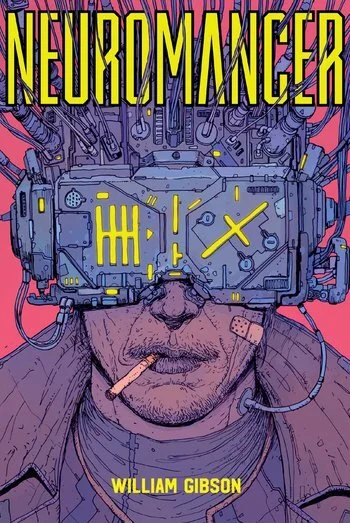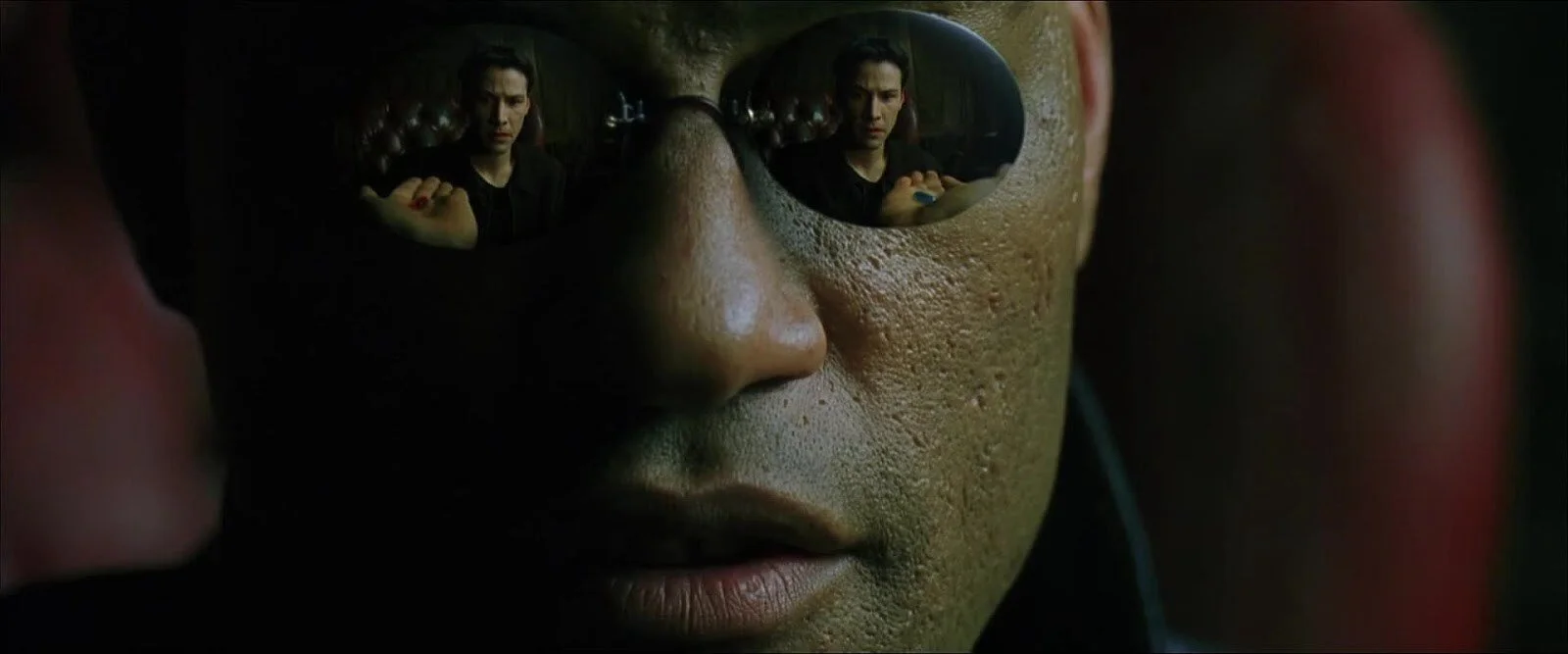The Dumb Cyberpunk Present (Time of Monsters #4)
I make no secret for my love of science fiction, but I don’t confuse it for prophecy. That’s one of the first things you learn if you actually think about the genre: it talks about the present, maybe looks at current trends and extrapolates, but there’s no augury at work. All the things from Star Trek that have actually come into being have been because people look at the fiction and decide “hey, let’s see if we can make that!”
This book is twenty years old, and the specifics haven’t really aged well: the attitudes laid out seem to, though.
Author Bruce Sterling, in the introduction to his book Tomorrow Now, compares the best futurists – and authors – to Jaques from Shakespeare’s As You Like It, noting that the best way to approach the future is to emulate him. In Sterling’s words “Jaques doesn't have to pretend to like this uprooted life of exile and uncertainty. Because he genuinely likes it. A consummate observer, he feels quite at home at the edge of futurity.” I read this passage back in late 2012, when everyone was talking about the imminent end of the world – with deep postmodern irony – and it informed my attitude going forward: I tried to be comfortable with uncertainty.
Sadly, as my last piece notes, we exist in a time of unbearable uncertainty. So I again look to fiction to try to interpret it.
Unfortunately, the last truly coherent movement in science fiction was cyberpunk – and, as the man who holds the trademark on the term in the United States, Mike Pondsmith, said “Cyberpunk was supposed to be a warning, not an aspiration.”
As an aside: I generally like Pondsmith, and his company is the only black-owned tabletop gaming company that I’m aware of (it’s certainly the biggest; it’s most likely not the only.) I’m given to understand that Pondsmith isn’t a litigious man, who copyrighted the term because he wanted to sell the tabletop game Cyberpunk 2020, which is being adapted as the video game Cyberpunk 2077. The fact of the matter is that he could have picked a different name and not gotten that particular copyright, and I’d appreciate being able to google a phrase involving the word “cyberpunk” without getting ad copy for the upcoming video game, which I oscillate between interested in and repulsed by, but it seems ironic that cyberpunk – which often features corporate ownership of every aspect of everyday life – is a copyrighted term.
This now counts as retro-futurism: what do you need all those wires for?
Let’s return to that, though: the last truly coherent movement in science fiction was cyberpunk. For those who are unaware, cyberpunk was born in the early 1980s, and predicted a radical intensification of what the authors saw going on at the time: the devaluation of human life, a widespread preference for artifice and simulation over reality and authenticity, and the formation of multinational corporations that couldn’t be effectively brought to heel by governments and spreading cancer-like through the social world around us. In short, it predicted in the early 1980s that people would one day live in a world that looked very much like the 1990s. Its authors – led by William Gibson – did this primarily by taking the temperature of the world around them and just predicting the worst non-apocalyptic future they could.
Of course, the world didn’t continue on the aesthetic trajectory that these authors predicted: the world didn’t become a rain-drenched brutalist nightmare where people have RCA ports behind their ears. I say aesthetic trajectory because cyberpunk very clearly describes the social reality we live in – but with the iMac and iPod and similar, Apple brought a soft, friendly aesthetic – I would even go so far as to refer to it as “twee” – forward that captured the imagination and led to our visions of the future adopting the aesthetic I’ve called “Jobsian Minimalism” – in contrast to cyberpunk’s consistent “used future” look.
This is the first google image search result for “twee”. Basically, if it has Wes Anderson or Zooey Deschanel involved, it’s twee. It suffused the Aughts the same way that whatever it is that Tim Burton is suffused the Nineties.
But at the same time that the future became all bright lights and gentle colors and soft curves, iTunes and the Kindle made it so you don’t actually own anything you buy on their stores: they can remove media at any time. The same law that allows this – the Digital Millenium Copyright Act – is the same thing that allows people to take content off of Youtube and prevents farmers from fixing their John Deere tractors. It’s some of the most important legislation to understand if you want to understand the world around you, because it touches upon every part of life.
And that’s something that I want to talk about: in cyberpunk, people have machinery inserted into their bodies that augment their capability. Oftentimes, this is just a modem that connects the frontal lobe to the internet, but sometimes it’s more extensive. The Ur-Text of Cyberpunk, William Gibson’s Neuromancer, features the character of “Molly Millions”: a former prostitute that decided to change careers and become a “razor girl”, with mirror-shades implanted directly over her eyes, superhuman reflexes, and blades in her fingertips.
But, as we could see with Paul Verhoeven’s best contribution to the genre, RoboCop, you don’t necessarily own the machinery inserted in your body: the people who made it can sneak code in through the back door and make certain things compulsory or impossible.
Tell me: if they came out with perfect cybernetic eyes that cost slightly less than an iPhone tomorrow, would you be surprised if it blurred out advertisements from competing companies or charged you eight cents every time you saw the color yellow? This is honestly the sort of thing I would expect: you’re allowing a company to get between you and the world, and the company has a legal obligation to make the most money possible.
When our world turned cyberpunk, we didn’t get that: machinery wasn’t inserted into our bodies. In the late aughts it inserted itself into our social lives. Social media is this exact thing: a money-making apparatus that replaces much of our social interaction. Just like the hypothetical cybernetic eyes, Facebook and similar platforms control what you see, and make certain content easier to see. These algorithms are designed to reinforce certain things, to collect certain information, and to influence decisions over a demographic scale.
We now live, fully, within a world effectively – if inaccurately – described by the authors of the cyberpunk movement. Much like they determined when they looked at their historical sources, the wealthy use their power to gather more power. The impoverished are treated as a resource to be extracted: a vast pool of labor power that can be bought cheap and exploited.
The only way Morpheus can afford this is that it’s all simulated.
So what do we do? I don’t know if you’ve price checked mirror-shades and leather trench coats lately, but adopting the aesthetic of a cyberpunk protagonist isn’t really an option, and it’s fundamentally useless to do so, anyway. I don’t know if this is the sort of thing that we want to cut along the grain of.
Is the attitude of the cyberpunk protagonist one worth copying? Not usually. The common situation is that the people who fall in the center of these narratives are the typical “punk” type: people who are capable and want to be left alone. They’re the ideal atomized subjects, because in the real world, this sort of person can be enticed to play the game if they’re given enough consideration.
No, what is needed is not a practical resistance, but an epistemic resistance: the problem is that certain ways of understanding the world – predicted by, but not founded upon, the source texts of cyberpunk – has led us to this current situation. To break free of the conditions we find ourselves in we need to think differently. We need to come up with ways of understanding the world that supersede and surpass those of the powerful.
Some of the best examples of this sort of thing are emerging now. The proliferation of Mutual Aid Networks because of the pandemic, and Bail Funds following the protests of the murder of George Floyd point in this direction. People banding together can create a space in which they are able to breathe and think and create. This is exactly what the powerful don’t want, because it’s been scientifically proven that people who benefit from generational wealth make poorer leaders: there’s a paper by Sean R. Martin of Boston College, Stephane Côté of the University of Toronto, and Todd Woodruff of West Point called “Echoes Of Our Upbringing: How Growing Up Wealthy Or Poor Relates To Narcissism, Leader Behavior, And Leader Effectiveness” that essentially says exactly that.
There are problems with Warren Ellis, and part of the problem is that he’s done bad things but made exceptional work (not his apology, sadly,) but I’ve always loved Transmetropolitan, because it points in this direction: it’s not about the protagonist — his power, as a journalist, comes from inspiring others to take action.
Cyberpunk suggests that one person in the right place can escape from the systems of control for a time. Perhaps this is true. But many people, working in concert, can splinter the apparatuses of control and increase the costs for those systems to run.
And when the walls come down, we will see that the future is more open than we ever imagined. There is a hard deadline on this, though: the climate is changing, and every day our imaginations wither more and more.
We need to get started.
※
If you’ve already given to the mutual aid networks and mutual aid funds above, and have a bit of scratch left over, you can support us by buying Edgar’s book. Also, please consider following our writing staff on Twitter, where you can find Cameron and Edgar. Just in case you didn’t know, we also have a Facebook fan page, which you can follow if you’d like regular updates and a bookshop where you can buy the books we review and reference.






